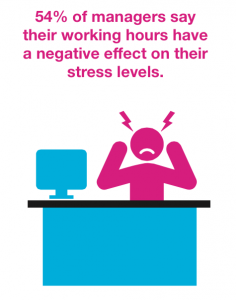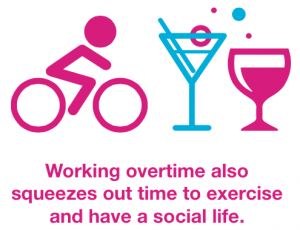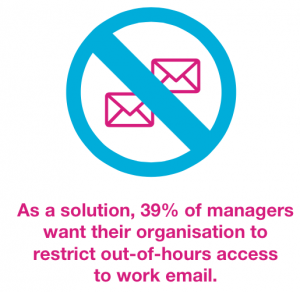Stressed and overworked: managers struggle in ‘always on’ work culture
Tuesday 12 January 2016
Managers are working longer hours than ever before, leading to increased stress as a result of the ‘always on’ culture that is dominating UK offices. That’s the message from the 2016 CMI Quality of Working Life study carried out with Sir Professor Cary Cooper and Professor Les Worral.
Of the 1,574 managers surveyed, the vast majority (77%) work for at least one additional hour each day, adding up to an extra 29 days over the course of a year. This extra time cancels out managers’ annual holiday entitlement (which averages only 28 days) leaving them stressed and overworked.
And 10% of those surveyed said they worked an extra three hours every day; the equivalent of working a 15-month year.
In total, 92% of respondents said they were working more than their contracted hours.
ALWAYS ON; NEVER RELAXED
Not surprisingly, those working long hours are more than three times as likely to report they feel stressed than those working no additional hours; 54% of managers said that long working hours increase levels of stress in workers. 
The report shows that by eating into the time available to relax, exercise and socialise, long-hours prevent managers being able to unwind. Managers surveyed for the study report a link between working longer hours and suffering from increased headaches, irritability and insomnia, early symptoms of mental health problems and potential burnout.
CMI chief executive Ann Francke said that a lack of professional management was to blame for this excessive working, with “accidental managers” unequipped to balance the needs of their team members with the needs of the organisation.
 “There’s nothing wrong with hard graft, but only if you’re well supported,” she said. “Accidental managers who lack the professional skills to deal with the causes of burnout are a threat to their health and others’ at work.
“There’s nothing wrong with hard graft, but only if you’re well supported,” she said. “Accidental managers who lack the professional skills to deal with the causes of burnout are a threat to their health and others’ at work.
“Productivity will also continue to suffer unless employers train their managers to prevent overwork and strike the necessary work/life balance.”
Effective management is found to be a key factor in handling stress in the work place; the worst management styles are shown to generate up to four times more stress than the best, with 28% of those reporting that their line managers are “secretive” or “suspicious” feeling stressed, compared to just 7% of those who believe their managers empower them to take their own decisions.
By contrast, innovative, entrepreneurial and empowering management styles were found to drive job satisfaction levels up to 2.5 times higher than ‘command and control’ styles.
In addition to poor line management, technology is also contributing to managers’ stress levels .
Mobile technology in particular was cited, with 61% of managers stating that it makes it hard to switch off from work. More than half of managers (54%) frequently check their emails outside normal working hours, with 21% checking it ‘all the time’.
Francke said: “Most of us are comfortable with the idea that a modern workplace requires us to occasionally pitch in out of hours. But the ‘always on’ culture must be switched off, with line managers encouraged to support an ‘always willing’ mindset that reflects the give and take necessary for a higher quality of working life.”
BUT SATISFACTION REMAINS
Despite the rise in hours and the resulting stress, managers’ job satisfaction is on the up.
More than two-thirds (67%) of managers are currently satisfied with their jobs, a rise of 12% on 2012, and higher than the 62% recorded in 2007 before the financial crash.
Positive feelings are associated with trust in their line manager (79%), a belief in their organisation’s values (64%) and a feeling of fair treatment by their employer (61%).
Sir Cary Cooper CBE, Professor of Organisational Psychology and Health at Manchester Business School, has led CMI’s research into the quality of working life over the last seven years.
“Businesses should be on alert for signs of burnout. Stress is a natural reaction to challenging conditions, and while it can raise motivation and help individuals meet deadlines in the short-term over longer periods is extremely damaging,” he said.
“Festering resentment at our long-hours culture risks boiling over and hurting UK productivity. Striking the right balance is crucial, requiring managers to act equitably and with empathy.”
Find out more about the Quality of Working Life study and download the full report at www.managers.org.uk/qualityofworkinglife
Quiet quitting among new-generation employees in poor and developing countries: implications for employers
The urgent steps employers must take at a time of rising dissatisfaction and disengagement
How I learned to beat imposter syndrome
NHS service manager Aliyah Akhtar CMgr MCMI has learned to manage feelings of inadequacy at work
Neurodivergence can be a superpower, if managers create the right conditions
Neurodivergence should be harnessed for its many benefits – which requires managers to create more balanced, open teams
Are workcations the solution to burnout?
They can give employees much-needed space to think, but workcations come with a host of practical implications for managers
Article
Our extensive range of articles are designed to keep you in the loop with all the latest management and leadership best practice, research and news.
Members See More
CMI Members have access to thousands of online learning and CPD resources. Learn more about our membership benefits
Join The Community
CMI offers a variety of flexible membership solutions, tailored to your needs. Find out more and get involved in the CMI community today.
